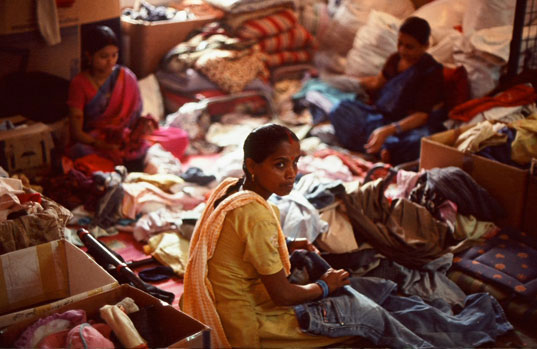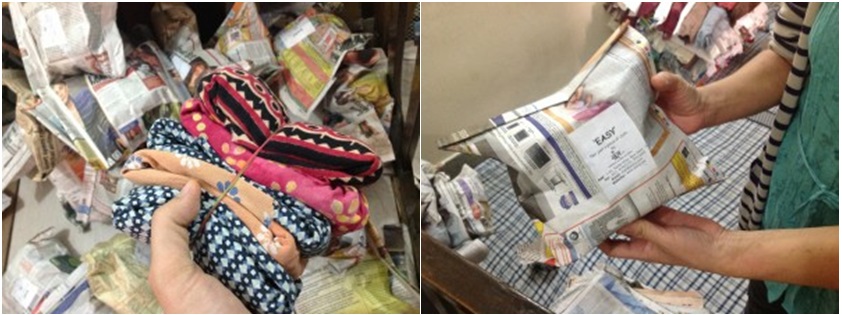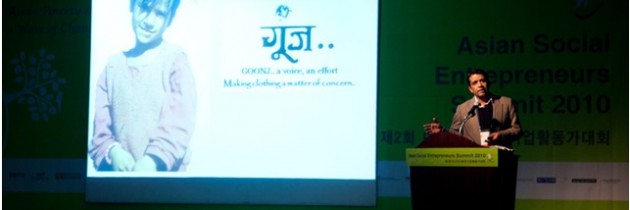Cloth for Dignity: WT visits Goonj, a Changemaker in India
âPoverty can be solved not just with costly resources or big investments, but with small pieces of cloth.â Anshu Gupta _ 2010 ASES Plenary Sesson
The relationship between Goonj and the Work Together Foundation has been built since the 2010 ASES (Asian Social Entrepreneurs Summit). Goonj actively participated in two ASES events, sharing its experiences to help fight poverty through the creation of a business model. Goonj now is the most desired organization for Korean youths to visit while traveling Asia to research Social Enterprises.
Goonj is a nationwide movement addressing the most basic but ignored need of clothing and the multifaceted role it plays in Indiaâs villages. Anshu is establishing a culture of sustained donations in India by creating a mechanism for second-hand clothes and goods to pass from the wealthy to the poor. It works as an economic bridge to link between wealthy, urban india and impoverished, rural India through a culture of sustained donations. Outside of India, there has been international focus on this innovation and change made by Goonj and Anshu, including as an Ashoka fellowship, a CNN-IBN Real Heroes award, inclusion on a list of the most powerful entrepreneurs on Forbes.com.
WT decided to visit to see Goonjâs work site, where the massive recycling innovation takes place. During the Smile Together Partnership screening process, we needed to visit one of the final candidates âLife Worldâ in India. Therefore, we set a day aside to meet our partner, Goonj.
When we visited the office, Anshu and his colleagues were waiting with a homemade Indian lunch, and this was only the beginning of warm greeting.
It seems Goonj receives many visit requests from the media, students and business partners. Despite their office being crowded with guests, they smoothly handled the situation and led us on a tour.
 We followed our guide, Harshie Wahie, to different work rooms included in the recycling process. The basement rooms in basement were filled piles of clothes and fabric donated from all over the Delhi area. To prevent huge transportation costs, Goonj has five offices and centers in major cities and cooperates with 150 partner groups, so that resources can be recycled at the local level.
We followed our guide, Harshie Wahie, to different work rooms included in the recycling process. The basement rooms in basement were filled piles of clothes and fabric donated from all over the Delhi area. To prevent huge transportation costs, Goonj has five offices and centers in major cities and cooperates with 150 partner groups, so that resources can be recycled at the local level.
In the each work rooms, the basic principle of the division is described on the wall with a real example. The whole system of recycling is quite similar to other organizations, such as the Beautiful Store in Korea
One of the biggest differences is that the reuse of resources differs in relation to the national situation. In rural area of India, there is still a need for basic material, so Goonj focus on creating and designing 35 different products, including notebooks, school bags and sitting mats etc. from the last shreds of waste paper, cloth & audio tapes. Those products are the key resources for community development programs across India.
*Vastra- Samman : A nationwide movement highlighting clothing as an ignored basic need.
*Cloth for Work : Villagers get clothes as a motivation for initiating development activities in their own area.
*School to School :Â Sensitizing urban schools to the needs of their counterparts in remote village schools. Channeling school material from cities to villages.
*Just a Piece of Cloth :Â Turning cotton cloth into sanitary napkin for women in slums and villages.
*Rahat :Â Intensifying our urban and rural networks to supply relief material to both natural and manmade disaster zones.
It was especially impressive to see how Goonj utilizes the last shreds of cloth. Many women stay hidden indoors during their menstrual cycles because of orthodox religious beliefs.
But another reason is that they donât have proper undergarments and use a piece of cloth to serve as a sanitary napkin. So over two million sanitary pads have been produced out of waste cloth and sent to villages and slums across India as a viable solution and powerful tool to open up the taboo subject of menses.
Returning to Goonjâs office, we heard more about Anshuâs vision and results.
Itâs amazing that piece of cloth can bring the dignity to human beings and the motivation for community development to rural areas. We have no doubt that his sincere heart and sound business model will allow Goonj to expand to more rural areas and bring the dignity to more people.
*Written by Wooyoung Park *Edited: by Patrick Ferraro
*Edited: by Patrick Ferraro





